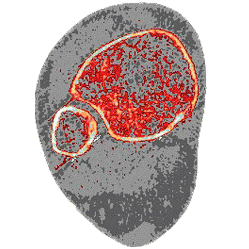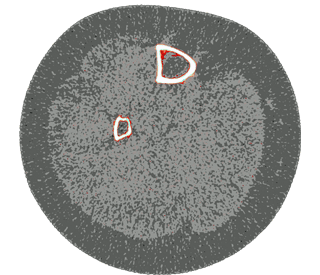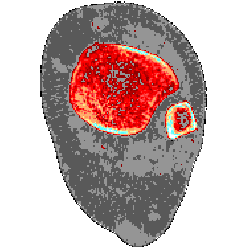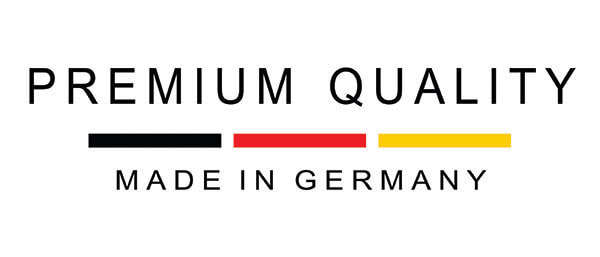pQCT and Leonardo in clinical application
pQCT and Leonardo
Bone density measurement and force plate
Clinical application
The aim of bone density measurement is to determine bone strength and to estimate the risk of fracture. The risk of fracture is primarily determined by the risk of falling. The strength of the bone is determined by its material properties and its geometry. While conventional, area-projected bone density measurement methods cannot adequately describe the bone strength, it can be predicted very accurately using pQCT by determining the physically correct bone density and the required geometric parameters. The risk of falling can also be reliably assessed with a series of simple exercises on the Leonardo force plate. The combination of Leonardo mechanography and pQCT thus provides a superior concept for musculo-skeletal diagnostics.

pQCT offers more than just bone mass measurement
Spongiosa and cortical density in g/cm³, bone strength, bone geometry and muscle parameters are determined using pQCT. Unlike conventional methods, the pQCT measurement provides the results in physically correct units (g/cm³ instead of g/cm²). Cancellous bone and cortical bone can be evaluated separately. The results are independent of body size and weight. Furthermore, there is no influence of extraosseous calcifications and changes in soft tissue composition.

Muscle cross-section and muscle density
pQCT also allows quantification of muscle parameters such as muscle cross-sectional area and muscle density. On the one hand, these are crucial for bone adaptation ("mechanostat"), and on the other hand, muscle parameters are essential for defining the clinical pictures of sarcopenia and dynapenia.

Fall risk assessment with Leonardo Mechanography
The risk of fracture is primarily determined by the risk of falling. Essential for determining the risk of falling is muscle function, especially muscle power, strength and balance. These parameters are also decisive for everyday practicality and thus quality of life. Leonardo mechanography allows the accurate measurement and analysis of key parameters of muscle function such as force, power, speed, energy and stiffness with high reproducibility. This makes Leonardo Mechanography suitable not only for diagnosing the individual muscular condition, but also for documenting treatment successes.
Find out more about our Leonardo Mechanography Products >

Do you have questions about our products or would you like to purchase a product?
Let our experts advise you. Simply arrange a non-binding consultation.
pQCT
The 3rd Dimension in Bone Density Assessment


XCT 2000L
Determination of
volumetric bone density,
Bone geometry and
Muscle parameters of arm or
Lower leg using pQCT.


XCT 3000
Determination of volumetric
Bone density, bone geometry
and muscle parameters of the arm or
Leg measureed by pQCT.
Let Stratec pQCT convince you!
Numerous scientific studies prove the validity of Stratec pQCT. Benefit from over 30 years of experience in muscle and bone research and over 1000 scientific publications on pQCT worldwide.